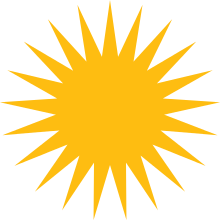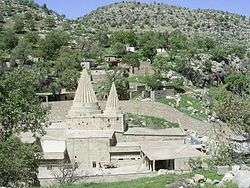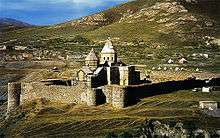Religion in Kurdistan
| Part of a series on Kurdish history and Kurdish culture |
 |
|
Religious diversity has been a feature of Kurdistan for a many centuries.[1] Main religions that currently exist in Kurdistan are as follows. Judaism, Christianity, Islam, Zoroastrianism, Yarsanism, Yazidism and Alevism. However, the majority of Kurds are Sunni Muslims.[2]
Traditional Kurdish religions
Zoroastrianism
Zoroastrianism was one of the dominant religions in Kurdistan before the Islamic era. Furthermore, in 20th century the Kurdish nationalists mentioned Zoroastrianism as a Kurdish religion to oppose the religious and political oppression of Arabs.[1] Currently, Zoroastrianism is an officially recognized religion in Iraqi Kurdistan and Iran. Many Kurdish individuals converted from Islam to Zoroastrianism especially after ISIS attacks to Kurdistan.[3][4] On 21 September 2016, the first official Zoroastrian fire temple of Iraqi Kurdistan opened in Sulaymaniyah. Attendees celebrated the occasion by lighting a ritual fire and beating the frame drum or 'daf'.[5] Awat Tayib, the chief of followers of Zoroastrianism in the Kurdistan region, claimed that many were returning to Zoroastrianism but some kept it secret out of fear of reprisals from Islamists.[5]
Yarsanism
Ahl-e-Hagh or Yarsanism is another religion that is associated with Kurdistan. Although most of sacred Yarsanism texts are in Gorani and all of Yarsan holy places are located in Kurdistan, but this religion has some followers among other ethnic groups as well.[6]
Yazidism

Most of the ethno-religious group of the Yazidi people live in Iraq and Turkey. For centuries they have been subjected to persecution and many of them have converted to Islam and Christianity.[1]
Abrahamic religions
Judaism
There used to be Jewish minority in most parts of Kurdistan, but most of them migrated to Israel in 20th century.
Christianity

For thousands of years Christians have existed in the area that is now Kurdistan, and were the indigenous inhabitants of the region. For example, Armenians occupied vast portions and made up at certain points the majority in Northwest Kurdistan, particularly in the region known as the Armenian Highlands. In Iraqi Kurdistan many Assyrians live there, and have been for at least 4,000 years. Within the official borders of Iraqi Kurdistan, around 20,000 Assyrians live in the Nahla valley, a region in the north, along with smaller communities in the cities of Dohuk, Erbil, and Zakho. However, due to ISIS, the Assyrian population within Iraqi Kurdistan has jumped up by the hundreds of thousands due to Assyrians that lived in the Nineveh Plains(not part of Iraqi Kurdistan officially) fleeing to Kurdish cities like Dohuk, Zakho, and Erbil as refugees. Additionally, Assyrian populated areas that were not part of Kurdistan but occupied in order to defend against ISIS such as Alqosh and Tesqopa are under the de facto control of Kurdistan as well. The Kurdish-Speaking Church of Christ (The Kurdzman Church of Christ) was established in Hewlêr (Arbil) by the end of 2000, and has branches in the Silêmanî, Duhok governorates. This is the first evangelical Kurdish church in Iraq.[7] So, in effect, Christians make up a large portion of Kurdistan.
Islam

The majority of Kurdish people are Muslim by religion.
Sunni Muslim
The majority of Kurds are Sunni Muslim.
Shia Muslim
There is a minority of Shia Muslims in southern parts of Kurdistan in Kirmashan, Khanaqin and Ilam region.[1]
Alevism
Alevi community that sometimes are called Qizilbash, mostly live in north western parts of Kurdistan. They are mostly concentrated in Dersim region.
Secularism as a polity principle
In the 21st century, Kurdish polities gained a reputation for spearheading secularism as a polity principle in the Middle East. This is not least due to the modernizing Kurdistan Communities Union movement and their radically secular Rojava model project in Syria[8][9][10] as well as opposition to islamist domestic and foreign policies of Turkey president Recep Tayyip Erdoğan.
References
- 1 2 3 4 Van Bruinessen, M. "Religion in Kurdistan" (Religion in Kurdistan). Hum.uu.nl. Retrieved 7 July 2013.
- ↑ Cigerxwin, Tarixa Kurdistan, I (Stockholm: Weşanên Roja Nû, 1985), p. 17.
- ↑ Rudaw:Head of Zoroastrian temple says people are returning to their roots
- ↑ "Zoroastrianism in Iraq seeks official recognition - Al-Monitor: the Pulse of the Middle East". Al-Monitor.
- 1 2 "Hopes for Zoroastrianism revival in Kurdistan as first temple opens its doors". Rudaw. 2016-09-21. Retrieved 2016-10-08.
- ↑ Martin van Bruinessen, When Haji Bektash Still Bore the Name of Sultan Sahak:Notes on the Ahl-i Haqq of the Guran district
- ↑ Revival Times
- ↑ "Syria Kurds challenging traditions, promote civil marriage". ARA News. 20 February 2016. Retrieved 8 October 2016.
- ↑ "PYD leader: SDF operation for Raqqa countryside in progress, Syria can only be secular". ARA News. 28 May 2016. Retrieved 8 October 2016.
- ↑ Carl Drott (25 May 2015). "The Revolutionaries of Bethnahrin". Warscapes. Retrieved 8 October 2016.